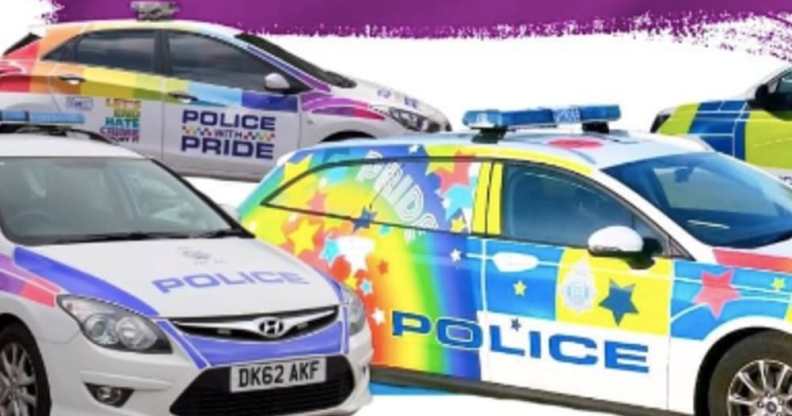Police slammed for plan to give LGBT+ folk ‘confidence’ by putting rainbows on cars

The new ‘hate crime’ cars coming soon to UK police forces (Instagram/@yourpolice.uk)
UK police are facing heavy criticism for a new fleet of rainbow-coloured squad cars they claim will boost “confidence” among the LGBT+ community.
The “hate crime cars” will be introduced in forces across the country in a bid to encourage more victims of anti-LGBT+ crimes to come forward to police.
Currently as many as 80 per cent of LGBT+ people don’t report hate crimes to the authorities, according to Stonewall, but police believe their colourful cars will change that.
“They get all the police insignia put on them as normal, but there will be normally something added on that is to do with the rainbow side of things,” said Julie Cooke, deputy chief constable of Cheshire Police.
Explaining the initiative on social media, she said that the “cost is quite minimal”, but is assured that the impact is “huge”.
“Actually the cost is quite minimal but the confidence that it can bring by just having that rainbow on there… and people say to me the impact of seeing the rainbow is so huge,” she said.
“The idea is that the car is there in the community, generally on normal policing patrol, just to show the community that we want you to come forward. If something is happening that you know isn’t right we absolutely want you to come forward.
“It is there to give confidence to our LGBT+ community, but also to other underrepresented groups.”
Hate crime is on the rise, but are rainbow police cars the answer?
Hate crimes reports in the UK have quadrupled over the past five years according to recent Home Office figures. The biggest proportionate rise was seen in transgender hate crimes, which soared by 16 per cent last year.
While increasing confidence in hate crime reporting is undoubtedly a positive thing, the police might want to look a little further than revamping their patrol cars.
A 2017 Stonewall report on LGBT+ policing uncovered shocking stories from the community, with several hate crime victims reporting that they’d been persistently misgendered and deadnamed by police.
Others were warned that they had “provoked” the crime and advised to “be more resilient”.
“I talked, they listened, but it was their attitude and I got the impression that it was not being taken seriously,” said one. “I felt that I had suffered twice: once a physical attack and the second an attack by the state,” said another.
Although many queer officers are now fighting to change the police’s reputation, many among the LGBT+ community remain unconvinced.
“I’m not impressed to be honest,” one trans person said of the rainbow cars, speaking to LBC. “Hate crime is serious and I feel this sort of thing trivialises it.”
“They need to take hate crimes against LGBTQ+, people of colour and disabled people seriously,” one Twitter user agreed. “They also need to take sexual and domestic crimes against women seriously. Rebranding their cars won’t help achieve that.”
Another added: “As a gay man I don’t want anything other than an overtly impartial, unbranded, efficient, effective, competent police force focused on protecting all who are innocent from all who are committing real crimes.”

